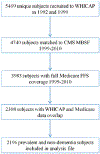Misidentification of Dementia in Medicare Claims and Related Costs
- PMID: 30315744
- PMCID: PMC6429550
- DOI: 10.1111/jgs.15638
Misidentification of Dementia in Medicare Claims and Related Costs
Abstract
Objectives: To examine how misidentification of dementia affects estimation of Medicare costs in a largely minority cohort of participants for whom accurate in-person diagnoses are available.
Design: Prospective cohort study.
Setting: Washington Heights-Inwood Columbia Aging Project, a multiethnic, population-based, prospective study of cognitive aging of Medicare beneficiaries aged 65 and older.
Participants: Individuals clinically diagnosed with dementia (n=495) and individuals clinically diagnosed without dementia (n=1,701).
Measurements: Medicare claims-identified dementia was defined according to the presence of any International Classification of Diseases, Ninth Revision, Clinical Modification diagnosis codes for Alzheimer's disease and related dementias in all available claims during the study period. Participant characteristics associated with claims misidentification of dementia were estimated using logistic regression. Effects of dementia misidentification on Medicare expenditures were estimated using generalized linear models.
Results: Medicare claims correctly identified 250 of the 495 (51%) dementia cases and 1,565 of the 1,701 (92%) nondementia cases. Sensitivity of claims-identified dementia was 0.51, and specificity was 0.92. Average annual Medicare expenditures were $14,721 for a beneficiary with a clinical diagnosis of dementia, and $18,208 for a beneficiary with claim-identified dementia, suggesting an overestimation of $3,487 per person per year when Medicare claims were used to identify dementia. Total annual expenditures for all beneficiaries with claims-identified dementia were $258,707 lower than that for all those who were clinically diagnosed, suggesting an overall underestimation of total Medicare expenditures if Medicare claims were used to identify dementia. Different types of misidentification have different effects on dementia-related cost estimates. Average annual expenditures per person were highest for false positives.
Conclusion: Misidentification of dementia in Medicare claims is common. Using claims to identify dementia may result in significantly biased estimates of the cost of dementia. J Am Geriatr Soc 67:269-276, 2019.
Keywords: Medicare claims; clinical diagnosis; cost; dementia.
© 2018, Copyright the Author Journal compilation © 2018, The American Geriatrics Society.
Conflict of interest statement
Figures
References
-
- Boustani M, Peterson B, Hanson L et al. Screening for dementia in primary care: A summary of the evidence for the U.S. Preventive Services Task Force. Ann Intern Med 2003;138:927–937. - PubMed
-
- Chodosh J, Petitti DB, Elliott M et al. Physician recognition of cognitive impairment: Evaluating the need for improvement. J Am Geriatr Soc 2004; 52:1051–1059. - PubMed
-
- Mitchell AJ, Meader N, Pentzek M. Clinical recognition of dementia and cognitive impairment in primary care: A meta-analysis of physician accuracy. Acta Psychiatr Scand 2011;124:165–183. - PubMed
Publication types
MeSH terms
Grants and funding
LinkOut - more resources
Full Text Sources
Medical


